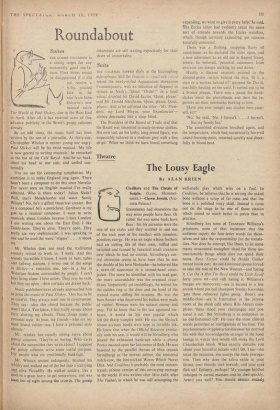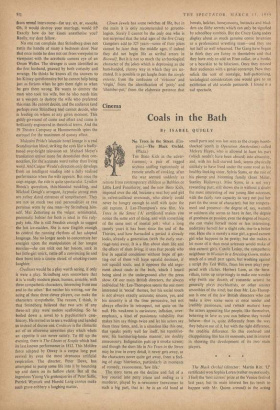Theatre
The Lousy Eagle
By ALAN BRIEN
Creditors and The Cheats of Scapin. (Lyric, Hammer- smith.)—Clown Jewels. (Vic- toria Palace.) STRINDBERG had obsessions the way some people have fleas. Or rather the way some birds have fleas : for his parasites were the size of sea crabs and they' scuttled in and out of the rock pool of his intellect with ceaseless, pointless energy. He was an eagle whose feathers had an itching life of their own, ruffled and twitched and fanned by fanatical small creatures over which he had no control. Strindberg's cen- tral obsession seems to have been that he was the double of his hero Nietzsche—he behaved like a sawn-off superman in a second-hand strait- jacket. The more he identified with his mad god, the more unavoidable was his eventual cruci- fixion. Impatiently yet tremblingly, he waited for the sudden ring at the door and the hand of the trained nurse stifling his screams. He was the born hunter who discovered his bullets were made of rubber. Women were his natural enemy and prey. Yet he knew that in the last agonised em- brace, it would be his own jugular which felt the sharp vampire teeth. He was the Shylock whose account books were kept in invisible ink. He knew that when the Official Receiver eventu- ally took his seat, it would still be Strindberg who played the exhausted bankrupt while a plump Portia insisted upon her last ounce of flesh. He was haunted by the parallel themes of Man (equals Strindberg) as the eternal debtor, the immortal milch-cow, the hen-pecked Worm Which Never Dies. And Creditors is probably the most concen- trated, cablese version of this unvarying message to the world. It was written after Miss Julie, after The Father, in which he was still attempting the well-made play which wins on a foul. in Creditors, he believes that he is serving the naked bone without a scrap of fat meat and that the bone is a polished ivory skill. Instead it turns out on the stage to be one of those classics which sound so much better in précis than in practice.
Strindberg has none of Tennessee Williams's prissiness, none of that insistence that the audience supply the four-letter words for them- selves and take the responsibility for the transla- tion. Nor does he attempt, like Ibsen, to let some massy ornamental metaphor stand for those un- mentionable things which dare not speak their name. Rose Tattoo could be Hedda Gabler turned inside out : the old-fashioned spouse forced to take the role of the New Woman—and hating it. Cat On A Hot Tin Roof could be Little Eyolf forty years on—and still hating it. Williams's images are democratic—sex is success in a fun arcade where pin-ball champion Stanley Kowalski 'gets those coloured lights going.' lbsen's are middle-class—sex is frustration in the private room of the plush café where Rita Almers com- plains 'there stood your champagne and you tasted it not.' But Strindberg is as outspoken as an old-fashioned GP. He uses the most clinical words permitted to' intelligentsia of his time. The psychosomatic crippled artist discusses his married life with that knowledgeable stranger in the hotel lounge in words that would still make the Laird Chamberlain blush. What exactly disturbs you about your beautiful buxom wife? Oh, I sec—she takes the ipitiative, she usurps the male preroga- tive. Then why does the saliva rattle in your throat, your thumbs turn inwards, and your eyes flick up? Epilepsy, perhaps? My younger brother indulged in carnal excesses and he died quickly. Aren't you well? You should abstain entirely from sexual intercourse—for say, six, er, months. Oh, it would destroy your marriage, would it? Exactly how do her kisses anwsthetise you? Really, my dear fellow.
No one can complain that Strindberg does not rattle the handle of many a bedroom door. Nor that once inside he does not cut from viewpoint to viewpoint with the acrobatic camera eye of an Orson Welles. The stranger is soon identified as the first husband, gnawed by both curiosity and revenge. He thinks he knows all the answers to his Kinsey questionnaire but he cannot help being just as furious when he gets them right as when he gets them wrong. He wants to destroy the man who took his wife, but he also needs him as a weapon to destroy the wife who preferred this man. He cannot decide, and the audience (and perhaps even Strindberg too) cannot decide, who is feeding on whom at any given moment. This giddy-go-round of cause and effect and cause is brilliantly engineered in theatrical terms. And the 59 Theatre Company at Hammersmith spins the carousel for the maximum of queasy effect.
Malcolm Pride's lakeside hotel lounge is a real Scandinavian blind, striking the eyes like a badly- tuned over-bright television set. Michael Meyer's translation strives more for denotation than con- notation, for the accurate word rather than living word. And Caspar Wrede's direction only develops from an intelligent reading into a fully realised performance when the wife appears, But once the cogs engage, the ride is quite spectacular. Lyndon Brook's querulous, thin-blooded weakling, and Michael Gough's arrogant, hypnotic strong man are rather dated extremes of temperament. They are not so much two real personalities as two personas worn by one man—by Strindberg him- self. Mai Zetterling as the vulgar, sentimental, pneumatic bolster for both is ideal in this roly- poly role. She is still Swedish enough to suggest the hot ice-maiden. She is now English enough to control the running rhythms a her adopted language. She no longer needs to concentrate her energies upon the manipulation of her tongue muscles—she can stick out her bosom, suck in her little-girl smirk, rattle off a convincing lie and then burst into a coarse shriek of smoking-room laughter.
Creditors would be a play worth seeing, if only it were a play. Strindberg says somewhere that it is 'a really modern piece, human, amiable, with three sympathetic characters, interesting from one end to the other.' But neither his writing, nor the acing of these three clever players, can make the characters sympathetic. The reason, I think, is that Strindberg believed that two acts of any three-act play were useless scaffolding. So he boiled down a novel to a psychiatrist's case- history. He invited us to see a wedding and handed us instead of decree nisi. Creditors is the climactic act of an otherwise unwritten play which whets an appetite it can never satisfy. To fill up the evening, there is The Cheats of Scapin which had its last known performance in 1812. This Moliere farce adapted by Otway is a corpse long past revival by even the most strenuous artificial respiration. The director, Peter Dews, has attempted to pump some life into it by bouncing up and down on its hollow chest. But all the ingenious Young Vic grotesqueries of Peter Sallis, Patrick Wymark and Harold Lang cannot make such grave-robbery a laughing matter. Clown Jewels has some twitches of life, but in the main it is only recommended to geronto- logists. Surely I cannot be the only one who is not surprised that the total ages of the five Crazy Gangsters add to 325 years—some of their jokes cannot be later than the middle ages, if indeed they did not begin life as scribal errors in Beowulf. But it is not so much the archteological character of the jokes which is depressing as the ham-handed, clumsy way in which they are un- crated. It is possible to get laughs from the simple entente, from the confusion of 'virtuoso' and 'virgin,' from the identification of 'potty' and `chamber-pot,' from the elaborate pretence that bowels, belches, honeymoons, buttocks and blad- ders are filthy secrets which can only be signified by schoolboy symbols. But the Crazy Gang today display about as much genuine comic invention as a professional wrestling team--and they are not half so well rehearsed. The Gang have begun to think they are funny in themselves and that they have only to add an Eton collar, or a bustle, or a bearskin to be hilarious. Once they treated their audiences with a genial contempt. Now they solicit the sort of nostalgic, half...patronising, sociological consideration one would give to an exhibition of old seaside postcards. I found it a sad spectacle.



















































 Previous page
Previous page